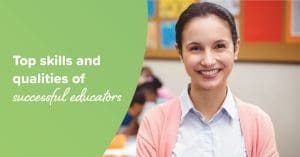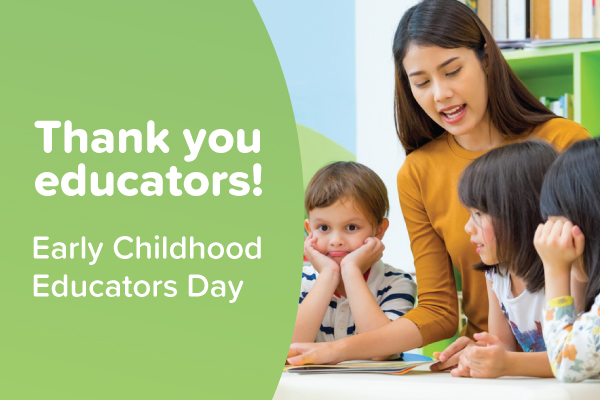While working in early childhood education can involve lots of fun caring for and engaging with children, the reality of life as an educator goes far beyond playing in the sandpit.
As an early childhood educator, you provide essential caregiving and play-based learning experiences for children during a critical time of development. The first five years of life see more neural connections formed in the brain than at any other time in life.
With this in mind, educators require training to develop the appropriate skills and qualities that will equip them to give children the very best start possible for a thriving future.

The skills and qualities of an early childhood educator
When you think of an early childhood educator, what comes to mind? Kind and patient? Gentle? Sure, these are lovely qualities but being a successful educator goes further than that.
There are various important skills and qualities an early childhood educator requires to deliver the highest quality early childhood education experience for children. Here some key areas that are necessary to develop as you work towards a career in early childhood education:
Critical thinking
This is the ability to evaluate, compare and form opinions. Useful for solving problems in the workplace or making assessments.
Empathy
Being able to understand the way others are feeling and respond appropriately is a must in any workplace. This could apply to relating to children, parents or other educators.
Adaptability
Sometimes situations change, at times quickly, and it’s important to be able to adapt to new conditions.
Growth mindset
To have a growth mindset is to believe that we can all improve our abilities through learning. With a growth mindset you are more likely to be motivated in the workplace and support others in striving for goals too.
Reflectiveness
Being capable of reflecting on our approaches, behaviours and learnings is a great tool to self-assess through thoughts and optimise outcomes.
Collaboration
Teamwork is crucial in the early childhood education workplace, so being comfortable with collaboration is a soft skill will help you to flourish in this environment.
Confidence
Working with children you need to have the confidence to be a little silly sometimes and speak up as needed. A little confidence goes a long way for you to succeed.
Communication
Effective communication skills underpin relationships. Developing these skills will ensure that you can send and receive clear messages with others, improving bonds and understanding situations accurately to inform your actions.
Listening
An extension of communication skills, listening to what others have to say, whether they are children or adults, plays an important role in creating a meaningful relationship and a clear understanding of a person feels or needs to thrive.
Decision-making
Making decisions can be challenging, but developing this skill along with other soft skills like reflectiveness and critical thinking will help you to make thoughtful choices in the workplace.
While these skills and qualities contribute to your success as an educator, you don’t have to have them all from the get go. Developing these areas takes time and the right approach to training can support this process.
The benefits of well-developed soft skills
It’s not just those who are working towards an early childhood education career who benefit from these soft skills and human qualities. These skills are transferable across many sectors and roles, as well as in life. At Practical Outcomes we incorporate a focus on soft skills in our early childhood education training with the understanding that they will enhance our learners’ careers and lives.
Soft skills — sometimes known as people skills — continue to be increasingly valued for their role alongside practical knowledge and skillsets for the workplace, including in early childhood education. When it comes to shaping a future that is compassionate and caring, soft skills are vital.
Through developing these skills, educators can better connect with children and one another, contributing to strong bonds. They can better individualise their care style and create meaningful and engaging learning experiences to motivate children, while also discovering their own full potential as an educator.
Human-centred approach to a human-centred career
The Practical Outcomes approach to developing these essential skills and qualities for early childhood education comes down to our human-centred education approach. The overall success of our learners can be enhanced through human-centred education. It has been shown to empower learners, sparking curiosity and creativity through their educational pursuits. In turn, this heightens the capability to thrive as an early childhood educator.
Self-reflection is a key tool utilised throughout the training journey at Practical Outcomes. As a practical representation of this human-centred education approach in action, we introduced practical placement reflective journals for our learners. Here you can hone in on the critical skill of self-reflection. This enables learners to take control of their training and ask themselves questions to extend their learning, such as — what am I learning, what are my strengths, what are my weaknesses?
This journey of self-reflection evolves throughout the duration of the course, helping learners to track progress on a more personal level and see exactly how far they have come.
Support to build skills for success
A human-centred education approach would not be complete without the support of trainers who are there with learners every step of the way. We ensure that practical learning along with theory and soft skills are all developed alongside the guidance of experienced and compassionate trainers.
The Practical Outcomes approach to training is undertaken with the goal of helping each and every learner to develop the skills and qualities for successful early childhood educators who flourish while helping young children to flourish as well.
To learn more about how we approach early childhood education courses, please feel free to get in touch with our team.



